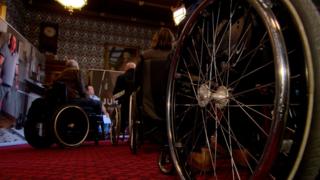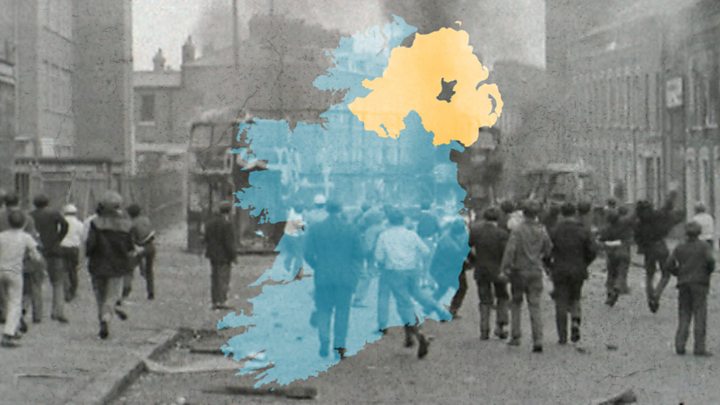Troubles victims' pensions row 'a shameful stand-off', says Judith Thompson

The prime minister has been told "a shameful stand-off" continues over whether London or Belfast pays for the pension for victims of the Troubles.
In a letter to Boris Johnson, Victims Commissioner Judith Thompson says the delay is "the ultimate insult".
Under legislation, the scheme was meant to have started on 29 May.
But it has been delayed by a dispute over who meets the estimated £100m cost; the NI Executive has also failed to pick a department to run it.
News of the set-back emerged in mid-May, leaving many victims furious at their treatment.
'Shameful impasse'
The pension was agreed in 2014 and signed into law in January.
It will make annual payments of between £2,000 and £10,000 to thousands of people, anywhere in the UK, who were physically or psychologically injured.
It will exclude those injured by their own actions.
In her letter, which is also been sent to the executive, Ms Thompson writes: "It is cruel, callous and insulting that this shameful stand-off played out in public is undoing the acknowledgement of pain, suffering and loss that the victims payment was to deliver.
"It has become the ultimate insult to those victims and survivors who campaigned for years to be acknowledged, respected and valued."

The executive has said the pension is unaffordable unless London pays, and points out that it was legislated for at Westminster.
The Northern Ireland Office has maintained it is for Stormont to resource from the existing block grant.
The executive has still not nominated a department to administer the pension, which was supposed to have happened by 24 February; it is believed Justice Minister Naomi Long recently indicated her department was prepared to assume responsibility.
Speaking to BBC News NI, Ms Thompson said: "The executive is saying no department can take it without funding and at the same time the Northern Ireland Office is saying we won't talk about money until a department is nominated.
"It is a circular, unacceptable argument. It is disgraceful."
Sinn Fein has said it had a "robust and frank exchange" with Northern Ireland Secretary Brandon Lewis on the pension and wider legacy issues on Tuesday.
The party said it reminded him of the government's "obligations" to fund the scheme.
Party leader Mary Lou McDonald added: "Sinn Féin remains committed to the provision of a victims' payment based on need and the full implementation of the Stormont House Agreement in a human right-compliant manner."
Meanwhile former Northern Ireland Secretary Lord Hain criticised both the government and the NI Executive, saying urgent discussions were required to resolve "the shameful impasse".
Referring to the threat of legal action by victims against the executive, he added: "How can politics have sunk so low that a severely injured victim has been forced to put the devolved administration on notice of judicial action to force it to honour its moral and legal obligations?"
What is the Troubles pension?
It was drawn up in 2019 by the UK government, when the Stormont assembly was not functioning.
The Troubles claimed more than 3,500 lives and the Northern Ireland Office has estimated another 40,000 people were injured.
The scheme aims to provide pension-like payments to victims of the Troubles, every year for the rest of their lives, with payments ranging from £2,000 to £10,000.
Victims will be eligible to apply if they were injured in an incident at any point between 1 January 1966 and 12 April 2010, the date that responsibility for policing and justice was devolved to Stormont.
The scheme will be open to those injured anywhere in the UK - no matter where they are from - and to those who normally reside in the UK but were injured anywhere in the world as a result of the Troubles.
But a victim who is not a resident of the UK and was injured outside the UK is not eligible.
The pensions will be backdated to 2014 - the date when they were first agreed, in principle, by the Stormont parties under the Fresh Start Agreement.
Older victims, over the age of 60, may opt to receive a lump sum rather than annual payments.
Most people will be assessed on medical records but face-to-face assessments will be used if this is not possible.
There will also be provisions to extend payments to those who care for Troubles' victims for more than 35 hours a week.
In the event of a Troubles victim's death, there will be provisions to make a payment to their loved ones.
Who decides how payments are made?
A judge-led board will decide who qualifies for the scheme, with the government insisting it would only apply to people who were injured "through no fault of their own".
However, that criteria was criticised by campaigners who argued it is an attempt to circumvent the definition of a victim contained in the 2006 Victims and Survivors Order.
That definition identified a victim or survivor as someone who has been "physically or psychologically injured as a result of or in consequence of a conflict-related incident" but it made no reference to an individual's culpability.
The board will have the power to exclude applicants with unspent convictions.